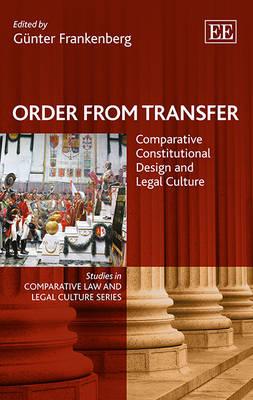Overview
Constitutional orders and legal regimes are established and changed through the importing and exporting of ideas and ideologies, norms, institutions and arguments. The contributions in this book discuss this assumption and address theoretical questions, methodological problems and political projects connected with the transfer of constitutions and law. Some of the chapters focus on the pathways, risks and side-effects of legal-constitutional transfers in specific situations, such as postcolonial societies and occupied territories. Others follow law beyond the official arenas into systems of legal pluralism, while others analyze how experimentalism generates hybrid constitutional orders. This interdisciplinary, multi-jurisdictional study will appeal to researchers, academics and advanced students in the fields of comparative constitutional law, comparative law and legal theory. Contributors: H. Alviar García, U. Baxi, P. Dann, J. Eckert, G. Frankenberg, R. Gargarella, F. Hanschmann, J. Hendry, S. Kadelbach, N. Markard, R. Michaels, H.K. Prempeh, R. Rubio Marín, M. Seckelmann, T. Tohidipur
Full Product Details
Author: Günter Frankenberg
Publisher: Edward Elgar Publishing Ltd
Imprint: Edward Elgar Publishing Ltd
ISBN: 9781781952108
ISBN 10: 1781952108
Pages: 384
Publication Date: 30 July 2013
Audience:
College/higher education
,
Postgraduate, Research & Scholarly
Format: Hardback
Publisher's Status: Active
Availability: To order

Stock availability from the supplier is unknown. We will order it for you and ship this item to you once it is received by us.
Reviews
'Frankenberg's work gives a new insight of what comparative law can be in the context of globalization, representing an outstanding achievement. His theory of transfer supersedes the metaphors of mainstream scholarship, displaying that constitutions are not mere commodities or items to be assembled. The real matter is rather, which meanings are generated through transfer. In this way, beyond any usual flat version, we may perceive that any constitutional relocation exhibits a reappraisal of the whole world we live in.' - Pier Giueseppe Monateri, University of Turin, Italy
`A fascinating collection of essays commenting on and developing Frankenberg's IKEA theory of legal transfer. With valuable theoretical analyses, comparative studies, attention to gender issues, post-colonial contexts, imposed law and legal history, this book is essential reading for anyone thinking about the circulation of legal models especially, but not only, in the area of constitutional law.' -- David Nelken, University of Cardiff, UK `Frankenberg's work gives a new insight of what comparative law can be in the context of globalization, representing an outstanding achievement. His theory of transfer supersedes the metaphors of mainstream scholarship, displaying that constitutions are not mere commodities or items to be assembled. The real matter is rather, which meanings are generated through transfer. In this way, beyond any usual flat version, we may perceive that any constitutional relocation exhibits a reappraisal of the whole world we live in.' -- Pier Giueseppe Monateri, University of Turin, Italy
Author Information
Edited by Günter Frankenberg, Emeritus Professor of Public Law, Philosophy of Law and Comparative Law, Institute for Public Law, Goethe University Frankfurt am Main, Germany




